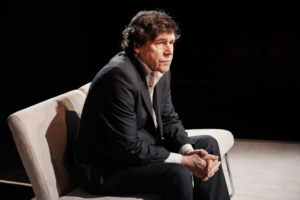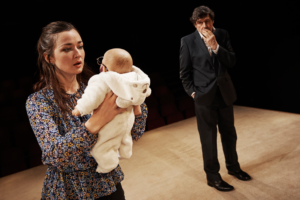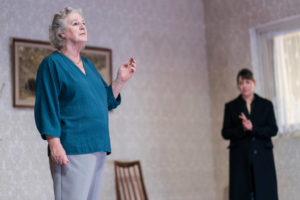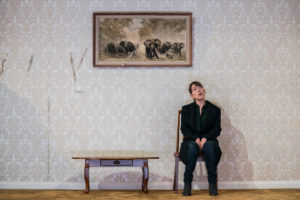Stephen Rea triumphs as psychotic bigot
★★★★

With theatres closed and all of us staying at home due to the coronavirus threat, I thought it might be a good idea to look at some of the theatre shows that were recorded live and are now being made available online or on TV for you to watch from the comfort of your sofa, starting with Cyprus Avenue by David Ireland.
The Royal Court and Abbey Theatre production starring Stephen Rea was filmed live in early 2019 and will be streaming on the Royal Court’s website and on their Facebook, Twitter and YouTube accounts until 26 April 2020.
Cyprus Avenue is a black comedy about a Belfast loyalist. He’s done something bad and he’s seeing a psychiatrist, played by Ronke Adekoleujo. We learn that he’s a bigoted man in fear of losing his identity as British.
In a series of flashbacks he’s seen meeting his granddaughter for the first time and believing that she is Gerry Adams, the president of Sinn Fein. From then on, it’s a rollercoaster ride as he vacillates between his love for his family and its newest member and his prejudice against Gerry Adams and all things Irish catholic.
There are two reasons you need to watch this: David Ireland’s hilarious script and Stephen Rea’s delivery of it. The latter has a face for which the expression ‘hangdog’ could have been invented and Eric’s sadness and confusion and frustration are all in that face. His hunched posture suggests the weight of Irish history.
If, like me, you think of Stephen Rea as an actor who exudes languidness, think again, because the best moment in this play is a monologue, akin to stand up comedy, where Eric races back and forth ranting and raving about Irishness. It had me rolling around on my sofa. That alone is worth the ticket price- if you were paying.
We first meet Eric on a bare stage with the audience on two sides, traverse style- and a nice touch by designer Lizzie Clachan, I thought to suggest the Protestant loyalist, catholic republican divide. The square is also in a sense the inside of Eric’s closed mind with characters appearing and disappearing as he thinks about them. She made a similarly effective use of traverse in the unforgettable Young Vic production of Yerma with Billie Piper.

Stephen Rea is supported by some precision directing from Vicky Featherstone where every move seems to mean something. And some fine actors. Amy Molloy is his daughter Julie who loves her dad but is offended by him, an internal conflict she makes you feel. She represents hope- a younger generation that has grown up with peace and is no longer twisted by sectarian prejudice. Andrea Irvine is Eric’s firm but caring wife and Chris Corrigan steals his scenes as a loyalist terrorist whose lust for violence is tempered by philosophical thoughts.
David Ireland’s script sparks and fizzes
David Ireland’s script sparks and fizzes with laughs at the expense of Eric’s shockingly warped logic and bizarre prejudices (he talks of ‘exotic catholic hairdos direct from the salons of the Vatican’).
As an examination of how loss of identity can lead to bigotry can lead to psychotic behaviour, Cyprus Avenue works well but the ending, which I don’t want to spoil, left me feeling the playwright had gone too far in wanting to shock. It draws comparison with Martin McDonagh’s The Lieutenant Of Inishmore which, with all due respect to the unquestionable quality of David Ireland’s writing, is a more thought-through play.
What we miss in this filmed version is the way as a member of the theatre audience you would be looking up at the actors and always seeing an opposing audience in the background as well the whole stage and its boundaries. While we gain from extreme close-ups of Stephen Rea’s magnificently craggy face, we lose quite a bit of the time the stage actor’s art of suggesting emotion and meaning through their whole body.
And, of course, the film director chooses what you should look at and while I accept that Stephen Rea is riveting, there were times when I wished, as in some football coverage, I could switch to a different camera looking at another actor’s reaction. The addition of some location filming in Belfast is a mistake. It did not add anything for me and merely broke the tension of the intimate enclosed stage setting.
I found the play flawed but the production is tight and Stephen Rea gives what must be the performance of a lifetime.
Click here to view this review on the YouTube channel One Minute Theatre Reviews
You can watch Cyprus Avenue online until 31 May:
Click here to view Cyprus Avenue on YouTube
Click here to watch Cyprus Avenue on the Royal Court website


